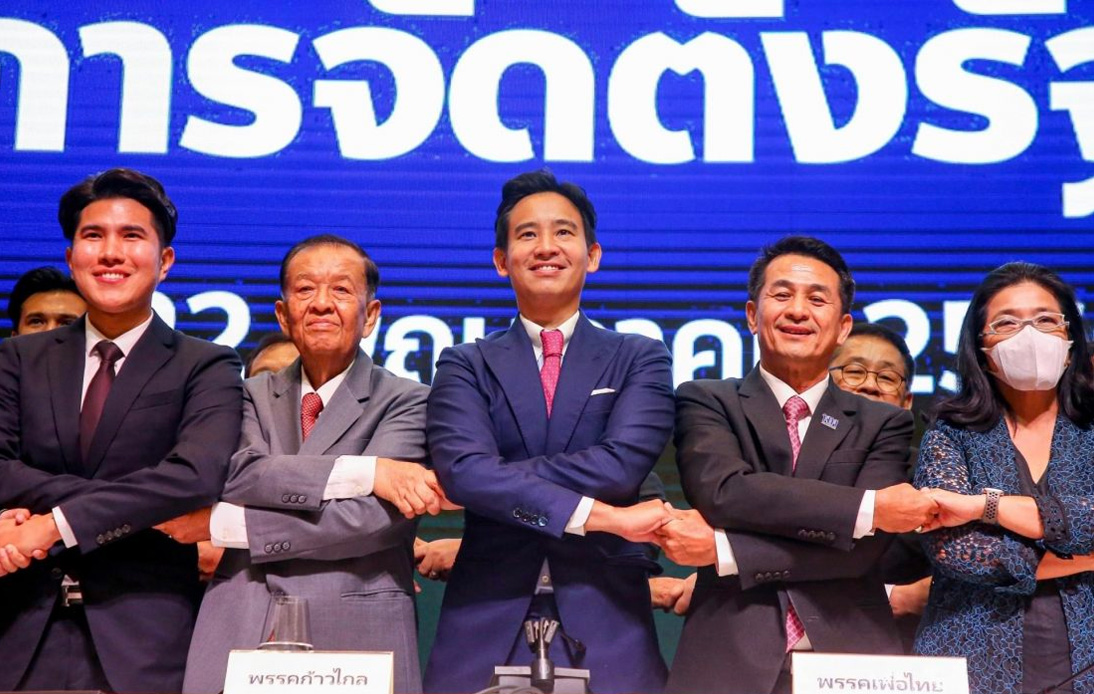
The Move Forward Party (MFP) has provided assurances that the policies of its government will not cause harm to the constitutional monarchy of this country.
However, on Monday, party leader Pita Limjaroenrat stated that the party will continue its efforts to amend the “lese majeste” law independently, without the support of other parties.
An alliance consisting of eight parties led by the MFP has signed an agreement outlining the working agenda of their proposed coalition government.
The 23-point memorandum of understanding (MoU), signed by the MFP, Pheu Thai, Prachachart, Thai Sang Thai, Seri Ruam Thai, Fair, Palang Sangkhom Mai, and Pheu Thai Ruam Phalang parties, does not include the amendment of Section 112, commonly known as the “lese majeste” law.
Among the significant items in the agreement are a revision of the constitution, the reclassification of cannabis as a narcotic drug, and the replacement of compulsory military conscription with voluntary recruitment.
Additionally, the agreement advocates for a same-sex marriage law that respects the religious beliefs of individuals who oppose it.
While announcing the completion of the agreement, Mr. Pita described it as a historic day, marking a peaceful transition in Thai politics. The signing ceremony was intentionally scheduled to coincide with the ninth anniversary of the May 22, 2014 coup.
“The purpose of the MoU is to gather common agendas that we agree to push through government and parliament. It’s our collective responsibility,” Mr. Pita stated at the press conference.
Mr. Pita emphasized that every party agreed that the core policies supported by the coalition members must not undermine the democratic system with the king as the head of state, and the revered status of the king must be respected.
On Monday, the eight parties, with a total of 313 House seats, met for two hours at the Conrad Bangkok, the venue for the MoU signing, before the scheduled ceremony at 4.30pm.
A source familiar with the negotiations mentioned that the MoU was revised at the request of coalition partners, including Pheu Thai, prior to the signing.
The revision included the phrase “the missions of the MFP-led government must not affect the democratic system with the king as head of state and the revered status of the king who cannot be violated”.
According to the source, the signed MoU differed slightly from the version made available to the media. The item concerning the “administration of justice for cases involving expressions of political views” was removed.
The source also revealed that Pheu Thai expressed disagreement with an amnesty plan during the coalition talks, citing concerns about conflicts of interest. The MFP eventually agreed to exclude it from the MoU.
When asked about the “lese majeste” law, Mr. Pita stated that the party would push for the passage of the draft law, which was submitted to the House in February 2021, and he anticipated its approval.
He further explained that under the MoU, coalition partners could pursue their individual agendas as long as they did not contradict the agreed-upon terms. The MFP would continue to advocate for all the policies it campaigned on.
Regarding speculations about lack of support from senators, Mr. Pita downplayed the rumours and mentioned that the working teams would hold discussions with the Senate to address any concerns senators may have about the MFP’s plans.
Mr. Pita dismissed rumours of Pheu Thai engaging in discussions with the Palang Pracharath Party (PPRP) to form an alternative coalition, emphasizing the unity of the eight parties.
He stated that it was premature to discuss the allocation of cabinet positions and the House speaker post, following reports that he would oversee the Defense Ministry.
Wanwichit Boonprong, a political science lecturer at Rangsit University, believes the MoU would be unnecessary if the MFP-led coalition did not rely on Senate votes or if Mr. Pita’s qualifications were not under investigation regarding his qualification.
“The MoU is something new. It is a written agreement to prevent betrayal. It’s a political tactic. As for policies, they can say what they want. But the signing of the MoU is to give the MFP confidence,” he stated.




















